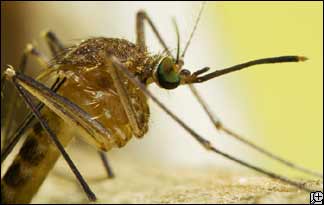Sewage Breeds Bigger, Faster Mosquitoes

"What it means for people is that we need to push to have cleaner
streams in cities," said lead author Luis Fernando Chaves, an ecologist
at Emory University in Atlanta. "One way to reduce these artificial
problems is to ensure the water quality of these streams by not dumping
sewage in them."
Atlanta has what's called a combined sewage overflow system. Under
normal conditions, the system mixes minimally treated wastewater with
storm run-off and delivers the mixture to a treatment site.
A new study, presented at the meeting of the Ecological Society of
America in Albuquerque, found far more mosquitoes in sewage-contaminated
streams than in clean ones. Sewage-bred mosquitoes were also bigger and
faster than those in purer waters.
Mosquitoes carry West Nile virus and other dangerous diseases. The new
study suggests that sewage is a public health hazard in more ways than
one.
When a huge storm comes along, however, the contents of the pipes
bypass the facility and flow instead into local rivers and lakes.
More than 750 communities in the United States use this type of system,
mostly around older cities in the Northeast and the Midwest.
Over a 16-week study period last summer, Chaves and colleagues sampled
water quality and mosquito larvae from two streams -- one that receives
contaminated overflows and one that doesn't -- in the Atlanta area. In
every sample they collected from the contaminated stream, Chaves said,
they found mosquito larvae. In a clean stream, on the other hand, larvae
showed up less than 10 percent of the time.
In a follow-up experiment, the researchers grew mosquitoes in containers
that held either normal tap water or polluted water. The polluted tanks
were full of ammonia phosphates, which are abundant in sewage and are
known to feed the bacteria and microorganisms that mosquitoes eat.
The experiment showed that the mosquitoes that had access to that
sewage-nutrient richness hatched from their eggs more quickly, were more
likely to survive and grew to be larger than the pollution-free
mosquitoes.
Besides having more to eat in polluted streams, Chaves said, mosquitoes also have less to worry about. Mosquitoes breed in water, but they breathe air, while the fish that eat them can't survive in the sewage-tainted water.
An earlier study by the Centers for Disease Control and Prevention found that bigger floods led to more mosquitoes -- particularly Southern house mosquitoes, which are a known carrier of West Nile virus. The latest research helps explain why.
"We've known for a while that it's likely that these combined sewage overflows were creating not only a mosquito problem but a West Nile problem," said Rosmarie Kelly, a public health entomologist at the Georgia Department of Community Health in Atlanta. The new work is "adding to this knowledge."
It's too soon to assume that more mosquitoes translate into more diseases, Kelly added, but the new findings emphasize the need to monitor the problem.
For now, she said, the best way for people to protect themselves and their neighbors is to wear bug repellent and dump out any reservoirs of standing water in their yards.
Copyright © 2009 Discovery Communications, LLC. The number-one nonfiction media company. To subscribe or visit go to: http://dsc.discovery.com